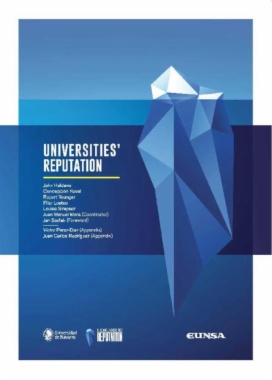One of the pillars that supports an acceptance of the university as a social, educational and knowledge generating institution is reputation.
The reputation of a university, or any other higher education institution, is ultimately an emblem of its acceptance amongst a variety of stakeholders –peers, experts, students and parents, funding bodies, media, employers, profesional organitations, international organitations, etc.
Over the course of its pages, inernational academics from universities and industry experts have reflecte don the origin, characteristics and, above all, the scope –institutional, economic, and social- of the reputation of universities.
Following the tradition of university, it is relevant to condense the most important ideas of this Universities’ Reputation in ten points, at the end of the book.
- Cover
- Title page
- Copyright page
- Table of contents
- Foreword. Jan Sadlak
- I. Students at the heart of the university education enterprise. John Haldane
- 1. Introduction
- 2. Interpreting rankings when choosing university
- 3. Perspectives on reputation
- 4. Foundations of higher education
- 5. Conclusions
- II. Reputation, quality and success in education
- 1. Introduction
- 2. The debate surrounding reputation
- 3. Culture of quality and culture of success
- 3.1. The study of quality and reputation as perceived quality
- 4. Quality in education
- 4.1. The purpose of education and personal quality
- 5. Ten challenges in achieving academic excellence in the university
- 6. Consequences for the governance of universities
- 7. Conclusions
- III. Corporate reputation: considering the reputation of the world’s leading universities. Rupert Younger
- 1. Introduction
- 2. The different publics of university reputation
- 3. The different dimensions of university reputation
- 4. Reputation engagement: the 3-2-1 model
- 4.1. Engagement factors
- 4.2. Reputation for and with someone
- 4.3. Authenticity
- 5. Conclusions
- IV. Strategic management of university reputation. Pilar Lostao
- 1. Introduction
- 2. Premises
- 2.1. Tangibles and intangibles
- 2.2. Reputation or reputations?
- 3. How to manage reputation
- 4. Conclusions
- V. How international phd students choose top universities and interpret reputation and rankings
- 1. Introduction: objectives and methods
- 2. Findings
- 2.1. How do PhD students define university reputation? What clues do they seek in terms of defining a reputable university?
- 2.2. To what extent do students use rankings and other information to support decision making?
- 2.3. What role does reputation play in attracting student talent relative to more tangible or factual factors such as location, facilities, price?
- 2.4. To what extent do rankings correlate with reputation and act as a proxy for reputation?
- 2.5. How do PhDs regard the reputation of their own university compared to peers?
- 2.6. Do students understand the concept of brand?
- 3. Conclusions
- VI. Cultivating reputation with the aid of communication. Juan Manuel Mora
- 1. Introduction
- 2. The process of forming reputation
- 2.1. At the heart of the organization
- 2.2. In the sphere of the stakeholders
- 2.3. The public opinion9
- 3. Cultivating reputation
- 4. The role of communication
- 4.1. Tasks of the communication department
- 4.2. A strategic vision of communication18
- 4.3. Organization of the department
- 5. Conclusions
- General conclusions
- BiBLiography
- Appendix. Position paper
- References

